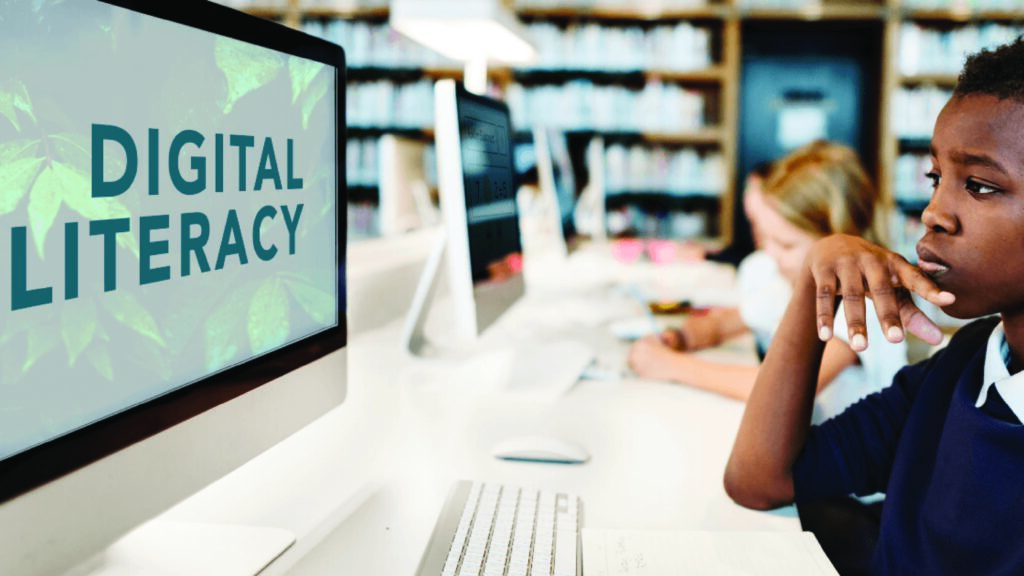Digital Literacy Skills Equipping students with the ability to navigate and critically assess digital information is essential in today’s tech-driven world. This includes knowing how to use computers, search the internet, communicate online, and evaluate digital content. These skills help people stay informed, connected, and productive in the digital world.
Imagine trying to do homework, talk to friends, or even play a game without knowing how to use a computer or phone. In today’s world, being digitally smart is just as important as knowing how to read and write!
Digital literacy is not just about using devices—it’s also about being safe online and knowing what information to trust. Kids and adults use digital skills every day in school, work, and play.
What Are Digital Literacy Skills?
Digital literacy skills refer to the ability to find, evaluate, create, and communicate information using digital technologies. These skills are essential in today’s world where much of our communication, learning, and work happen online. Being digitally literate means knowing how to use computers, the internet, software, and various digital tools effectively and responsibly.
As technology evolves, digital literacy is no longer limited to just using a keyboard or browsing websites. It also includes understanding online safety, recognizing fake news, using social media responsibly, and managing digital privacy.
Importance of Digital Literacy in Daily Life
These skills are essential in today’s world for education, work, and daily life. They include understanding how to safely use the internet, evaluate online content, and communicate effectively using digital tools. It also allows individuals to stay informed through digital news platforms and social media.
Key Components of Digital Literacy
- Technology skills: Understanding how to operate digital tools like computers, smartphones, and tablets.
- Online safety: Practicing safe behaviors like using strong passwords and avoiding suspicious links.
- Communication skills: Using emails, messaging apps, or video calls to share information clearly and respectfully.
Common Digital Literacy Skills for Students
- Using search engines to find reliable information.
- Creating and editing documents with word processors.
- Navigating learning platforms like Google Classroom or Microsoft Teams.
- Practicing responsible social media use.
- Understanding basic cybersecurity principles.

Benefits of Improving Digital Skills
- Better job opportunities: Most modern jobs require at least basic digital skills.
- Improved communication: You can easily connect with friends, teachers, and coworkers.
- Increased independence: Handling daily tasks like banking or learning becomes easier.
- Lifelong learning: The internet offers countless free tools and courses for self-growth.
Importance in Education and the Workplace
In education, digital literacy helps students access information, collaborate with others, and develop critical thinking. With online learning platforms and digital classrooms becoming more common, students need to be comfortable using digital tools to succeed in their studies. Teachers also need these skills to guide and support students in a tech-driven learning environment.
In the workplace, employers expect candidates to be proficient with computers and online systems. Digital literacy can improve productivity, support communication, and help workers adapt to new software or platforms. It also empowers employees to handle data securely and make informed decisions using digital resources.
Understanding Digital Literacy in Education
Digital literacy helps students access, understand, and use digital tools effectively. It supports learning through online research, educational apps, and digital collaboration. Teachers also rely on digital platforms to share content and assess students. With these skills, learners become better prepared for future studies. It’s an essential part of modern education.
Why Digital Skills Matter for Students
- Enhances critical thinking through access to diverse resources
- Builds confidence for using technology responsibly
- Prepares students for future careers that require tech knowledge
Digital Literacy in the Modern Workplace
Digital skills are now basic requirements for most jobs. From communication tools like email to data management software, employees must know how to use technology efficiently. It improves productivity, decision-making, and teamwork. Workers who lack digital literacy often struggle to keep up. Therefore, it’s a key factor in job success and career growth.
Key Digital Skills Needed at Work
- Using communication tools like Zoom, Slack, or Teams
- Managing files with cloud storage platforms like Google Drive
- Creating documents, spreadsheets, and presentations
- Practicing online safety and data protection
- Collaborating through shared digital workspaces
Building Digital Literacy Skills
Developing digital literacy starts with basic computer knowledge and grows with practice and continuous learning. Schools and training centers often offer courses on how to use digital tools, understand cybersecurity, and practice good digital habits. These programs are vital for both children and adults to keep up with the fast-paced digital world.
Individuals can also improve their digital skills through self-learning—watching tutorials, joining webinars, or exploring new apps and software. Encouraging curiosity and providing access to technology helps people become more confident and responsible digital users.
Benefits of Being Digitally Literate
- Helps in finding reliable information quickly
- Makes online learning and working easier
- Increases job opportunities in a digital world
Key Digital Literacy Skills
- Basic computer and device handling
- Navigating the internet and search engines
- Evaluating online sources for accuracy
- Using digital tools like word processors and spreadsheets
- Understanding privacy and cybersecurity basics
Tips for Building Digital Literacy
- Encourage regular use of technology in daily tasks
- Promote safe and respectful online behavior
- Provide access to digital learning tools and resources
- Support critical thinking when reading online content
Conclusion
In our modern, tech-driven society, digital literacy is not just a helpful skill—it’s a necessary one. From education to employment, being digitally literate helps individuals access information, solve problems, and communicate effectively in a digital world.
By investing time in developing digital literacy skills, individuals can stay relevant and safe in an ever-changing technological landscape. Whether you’re a student, a teacher, or a professional, growing your digital literacy empowers you to thrive and participate fully in today’s digital society.
